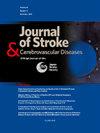西洛他唑和银杏叶提取物 EGb 761 联合治疗急性非心肌栓塞性缺血性脑卒中患者的有效性和安全性(RENEW)的原理与设计:试点和可行性随机对照试验。
IF 2
4区 医学
Q3 NEUROSCIENCES
Journal of Stroke & Cerebrovascular Diseases
Pub Date : 2024-11-10
DOI:10.1016/j.jstrokecerebrovasdis.2024.108105
引用次数: 0
摘要
背景:阿司匹林和氯吡格雷双重抗血小板疗法是急性缺血性中风(AIS)的标准治疗方法。西洛他唑已成为一种安全的替代疗法,具有多种效应,可在不增加出血风险的情况下预防中风,并已被证明可减少急性期的神经功能恶化(ND)。据报道,银杏叶提取物(EGb 761)也能改善 AIS 后的神经功能损伤。本试验旨在评估西洛他唑和 EGb 761 联合用药在减少非心肌栓塞性 AIS 患者早期卒中复发和 ND 方面的有效性和安全性:RENEW试验是一项前瞻性、随机、主动对照、双盲、平行、多中心IV期研究。500名在症状出现后72小时内就诊的非心肌栓塞性AIS患者将随机接受阿司匹林100毫克、西洛他唑200毫克加EGb 761 160毫克/天,或阿司匹林100毫克、氯吡格雷75毫克/天,为期90天。主要结果包括住院期间的综合 ND 率和 90 天内的中风复发率。次要结果包括ND率、AIS复发率、出血性中风率、出血性转变率、功能结果(改良Rankin量表0-2)、出血事件以及头晕障碍量表评分的变化:RENEW试验有望为阿司匹林、西洛他唑和EGb 761联合治疗非心肌栓塞性AIS的安全性和有效性提供证据:该试验已在 ClinicalTrials.gov (NCT05445895) 上注册。本文章由计算机程序翻译,如有差异,请以英文原文为准。
Rationale and design of the efficacy and safety of combination of cilostazol and gingko biloba extract EGb 761 in patients with acute non-cardioembolic ischemic stroke (RENEW): A pilot and feasibility randomized controlled trial
Background
Dual antiplatelet therapy with aspirin and clopidogrel is the standard treatment for acute ischemic stroke (AIS). Cilostazol has emerged as a safe alternative with pleiotropic effects that prevent stroke without increasing the risk of bleeding and has been shown to reduce neurological deterioration (ND) in the acute phase. Ginkgo biloba extract (EGb 761) has also been reported to improve neurological impairment following AIS. This trial aimed to evaluate the efficacy and safety of the combination of cilostazol and EGb 761 in reducing early stroke recurrence and ND in patients with non-cardioembolic AIS.
Methods
The RENEW trial is a prospective, randomized, active-controlled, double-blind, parallel, multicenter phase IV study. Five hundred patients with non-cardioembolic AIS presenting within 72 h of symptom onset will be randomized to receive either aspirin 100 mg and cilostazol 200 mg plus EGb 761 160 mg daily or aspirin 100 mg and clopidogrel 75 mg daily for 90 days. The primary outcomes included the combined ND rate during hospitalization and stroke recurrence within 90 days. Secondary outcomes included the rates of ND, recurrent AIS, hemorrhagic stroke, hemorrhagic transformation, functional outcomes (modified Rankin Scale 0–2), bleeding events, and changes in the dizziness handicap inventory scores.
Discussion
The RENEW trial is expected to provide evidence for the safety and efficacy of combining aspirin, cilostazol, and EGb 761 as an alternative to standard therapy for the acute management of non-cardioembolic AIS.
Trial Registration
This trial was registered at ClinicalTrials.gov (NCT05445895).
求助全文
通过发布文献求助,成功后即可免费获取论文全文。
去求助
来源期刊

Journal of Stroke & Cerebrovascular Diseases
Medicine-Surgery
CiteScore
5.00
自引率
4.00%
发文量
583
审稿时长
62 days
期刊介绍:
The Journal of Stroke & Cerebrovascular Diseases publishes original papers on basic and clinical science related to the fields of stroke and cerebrovascular diseases. The Journal also features review articles, controversies, methods and technical notes, selected case reports and other original articles of special nature. Its editorial mission is to focus on prevention and repair of cerebrovascular disease. Clinical papers emphasize medical and surgical aspects of stroke, clinical trials and design, epidemiology, stroke care delivery systems and outcomes, imaging sciences and rehabilitation of stroke. The Journal will be of special interest to specialists involved in caring for patients with cerebrovascular disease, including neurologists, neurosurgeons and cardiologists.
 求助内容:
求助内容: 应助结果提醒方式:
应助结果提醒方式:


